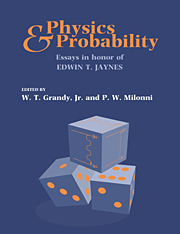Book contents
- Frontmatter
- Contents
- Preface
- Recollections of an Independent Thinker
- A Look Back: Early Applications of Maximum Entropy Estimation to Quantum Statistical Mechanics
- The Jaynes–Cummings Revival
- The Jaynes–Cummings Model and the One-Atom-Maser
- The Jaynes–Cummings Model is Alive and Well
- Self-Consistent Radiation Reaction in Quantum Optics – Jaynes' Influence and a New Example in Cavity QED
- Enhancing the Index of Refraction in a Nonabsorbing Medium: Phaseonium Versus a Mixture of Two-Level Atoms
- Ed Jaynes' Steak Dinner Problem II
- Source Theory of Vacuum Field Effects
- The Natural Line Shape
- An Operational Approach to Schrödinger's Cat
- The Classical Limit of an Atom
- Mutual Radiation Reaction in Spontaneous Emission
- A Model of Neutron Star Dynamics
- The Kinematic Origin of Complex Wave Functions
- On Radar Target Identification
- On the Difference in Means
- Bayesian Analysis, Model Selection and Prediction
- Bayesian Numerical Analysis
- Quantum Statistical Inference
- Application of the Maximum Entropy Principle to Nonlinear Systems Far from Equilibrium
- Nonequilibrium Statistical Mechanics
- A Backward Look to the Future
- Appendix: Vita and Bibliography of Edwin T. Jaynes
- Index
Bayesian Analysis, Model Selection and Prediction
Published online by Cambridge University Press: 21 October 2009
- Frontmatter
- Contents
- Preface
- Recollections of an Independent Thinker
- A Look Back: Early Applications of Maximum Entropy Estimation to Quantum Statistical Mechanics
- The Jaynes–Cummings Revival
- The Jaynes–Cummings Model and the One-Atom-Maser
- The Jaynes–Cummings Model is Alive and Well
- Self-Consistent Radiation Reaction in Quantum Optics – Jaynes' Influence and a New Example in Cavity QED
- Enhancing the Index of Refraction in a Nonabsorbing Medium: Phaseonium Versus a Mixture of Two-Level Atoms
- Ed Jaynes' Steak Dinner Problem II
- Source Theory of Vacuum Field Effects
- The Natural Line Shape
- An Operational Approach to Schrödinger's Cat
- The Classical Limit of an Atom
- Mutual Radiation Reaction in Spontaneous Emission
- A Model of Neutron Star Dynamics
- The Kinematic Origin of Complex Wave Functions
- On Radar Target Identification
- On the Difference in Means
- Bayesian Analysis, Model Selection and Prediction
- Bayesian Numerical Analysis
- Quantum Statistical Inference
- Application of the Maximum Entropy Principle to Nonlinear Systems Far from Equilibrium
- Nonequilibrium Statistical Mechanics
- A Backward Look to the Future
- Appendix: Vita and Bibliography of Edwin T. Jaynes
- Index
Summary
Introduction
In this paper, we shall consider (1) the derivation of prior distributions for use in Bayesian analysis, (2) Bayesian and non-Bayesian model selection procedures and (3) an application of Bayesian model selection procedures in the context of an applied forecasting problem. With respect to derivations of prior distributions, Jaynes (1980, p.618) has stated:
“It was from studying these frashes of intuition in Jeffreys that I became convinced that there must exist a general formal theory of determination of priors by logical analysis of the prior information–and that to develop it is today the top priority research problem of Bayesian theory.”
As is well known, many including Jeffreys (1967), Lindley (1956), Savage (1961), Hartigan (1964), Novick and Hall (1965), Jaynes (1968), Box and Tiao (1973), Bernardo (1979), and Zellner (1971, 1977, 1990) have worked to solve the “top priority research problem of Bayesian theory,” to use Jaynes’ words. Herein we shall consider further the maximal data information prior (MDIP) distribution approach put forward and discussed in Zellner (1971, 1977, 1990). A MDIP is a solution to a well-defined optimization problem and its use provides maximal data information relative to the information in a prior density. Also, as shown below, a MDIP maximizes the expectation of the logarithm of the ratio of the likelihood function, ℓ(θ|y), to the prior density, π(θ), i.e. ℓn[ℓ(θ|y)/π(θ)]. Several explicit MDIPs will be presented including those for parameters of time series processes–see Phillips (1991) for a lively discussion of this topic.
- Type
- Chapter
- Information
- Physics and ProbabilityEssays in Honor of Edwin T. Jaynes, pp. 195 - 206Publisher: Cambridge University PressPrint publication year: 1993
- 13
- Cited by

